The market is awash in new labels for “AI SEO.” We use GEO – Generative Engine Optimization – as our house term because that’s the direction most practitioners are taking. You’ll also see AEO, AIO, and LLMO used as near-synonyms. All of them point to the same outcome: Being included, cited, and recommended by large language models and AI answer experiences such as ChatGPT, Google AI Overviews, Perplexity, and other leading assistants.
What Each Term Means
- AEO – Answer Engine Optimization
- GEO – Generative Engine Optimization
- AIO – AI Optimization / AI Search Optimization
- LLMO – Large Language Model Optimization
In this article, we’ll use GEO as the umbrella term and treat AEO, AIO, and LLMO as near synonyms focused on ranking inside LLMs and AI answer experiences.
Why The Naming Is Confusing
This is a new market with overlapping scopes. As AI Overviews and chat answers rolled out, agencies rushed to name the discipline. AEO and GEO emerged as the most common labels in practitioner circles. Despite the different acronyms, they all describe the same destination: Earning inclusion and attribution inside AI-generated answers.


How GEO Differs From Classic SEO
GEO and classic SEO share the same goal: Turning qualified searchers into customers. Whether the path is organic search, an AI Overview, a Perplexity answer, or a ChatGPT citation, the objective doesn’t change. You want to rank in LLMs, get visibility, top placement or mention, and the ability to convert attention into leads.
What’s changing is the search landscape and customer behaviour. Increasingly, people ask questions in chat assistants before – or instead of – scrolling through results. Google now delivers AI Overviews that summarise answers with links. Discovery spans both web search and AI-driven answer experiences, often within the same session. While Google still dominates market share, your brand needs visibility across both.
Optimizing for clarity, authority, and performance strengthens GEO and SEO simultaneously. Organic results and AI answers share the same business outcome: Generating qualified leads from active searchers. The foundation is the same – answer-first content, strong entities and schema, credible sourcing, and fast, crawlable pages.
Our test-driven approach measures inclusion and citations, then reverse-engineers how engines and models select sources. The result? Your brand gets mentioned – or chosen first – in both environments.
Because the surfaces overlap, the strongest strategy is unified. You need a partner that runs controlled tests, measures visibility across assistants, and fine-tunes entities, content, and technical signals for both web search and AI-powered platforms.
If you’re ready to grow leads from organic search and AI-driven experiences, contact First Rank today and make every channel work for you.
Are AEO and GEO basically the same?
In practice, yes. Both aim to earn inclusion and citations in AI answers. As this is a new thing in the market, there are a lot of different names floating around.
Does classic SEO still matter for LLM rankings?
How do we get cited by answer engines?
Contact First Rank for a free consultation, and we’ll create a customized plan for your business. Our team will analyze your current visibility, optimize your content and entities, and build a strategy tailored to improve your chances of being cited by answer engines.
Jacob Kettner is the owner and CEO of First Rank Inc., a digital marketing agency based in Winnipeg, Manitoba. He currently sits on Manitoba Chamber of Commerce Small Business Advisor Council which assists people grow their small businesses in Manitoba.


